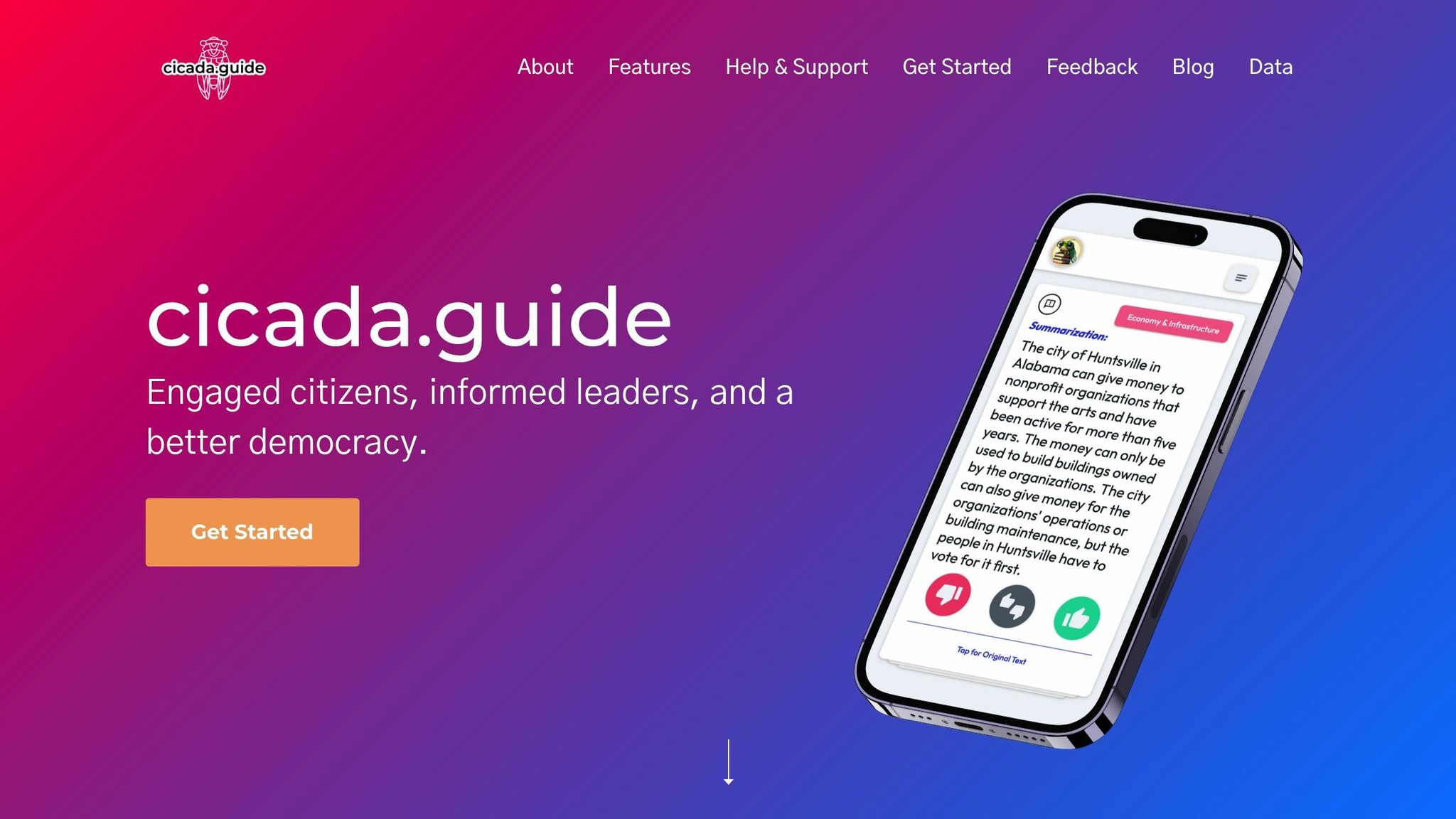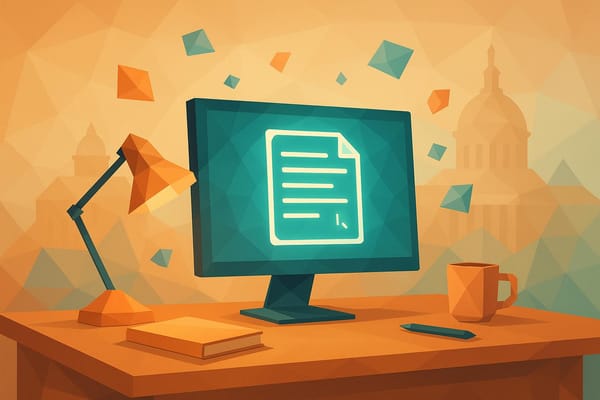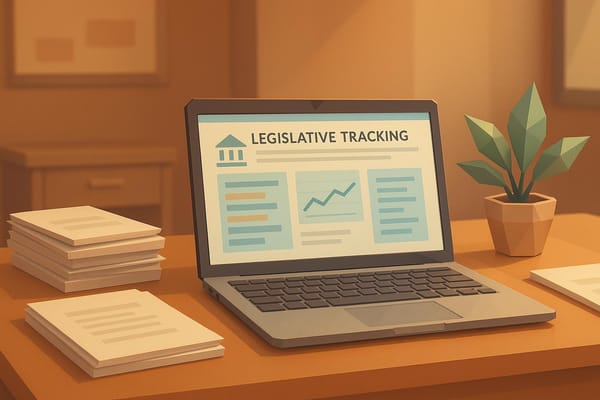Can't Follow Complex Legislation? Here's the Solution
Navigate complex legislation with AI tools and resources that simplify legal language and keep you informed about your rights and laws.

Understanding complex laws and legal jargon can feel overwhelming, but there are tools and strategies to make it easier. Here's a quick guide:
- Problem: Legal documents are hard to read due to complex language, outdated terms, and dense structure. Over 21% of U.S. adults struggle with basic reading, making laws inaccessible to many.
- Solution: AI tools like Cicada.guide simplify legal language, offering clear summaries, Q&A features, and personalized updates to help you understand legislation.
- Other Tools: Platforms like GovTrack.us, LegiScan, and TrackBill help track bills, voting records, and amendments.
- Learn Legal Terms: Use resources like Merriam-Webster Law Dictionary or apps like Legalese Decoder to break down jargon.
- Engage with Lawmakers: Contact representatives, track their votes, and share your opinions using structured, respectful comments.
Quick Comparison of Legislative Tools
| Platform | Features | Cost |
|---|---|---|
| GovTrack.us | Free bill tracking, alerts | Free |
| LegiScan | Basic to advanced tracking | Free - $25+ |
| TrackBill | Team collaboration, reports | Custom pricing |
AI Tools That Make Laws Easier to Read
Using Cicada.guide to Understand Laws

Legal jargon can be overwhelming, but AI tools are stepping in to make sense of it. Cicada.guide is one such platform that uses artificial intelligence to turn dense legal documents into easy-to-read summaries.
Here’s what Cicada.guide offers:
- AI-generated bill summaries
- Interactive Q&A about legislation
- Personalized feeds for legislative updates
- Tracking voting records
- Analyzing value alignment with bills
With these features, users can quickly grasp what a bill means, making it easier for anyone to stay informed and engaged with the legislative process.
How AI Summaries Help Citizens
AI tools like Cicada.guide go beyond just summarizing bills - they actively help people understand and engage with laws. These tools break down barriers and make legislative information more accessible.
"In an era where civic engagement and legislative transparency are more critical than ever, cicada.guide was designed to empower citizens with accessible, actionable information about laws and legislative processes."
Here’s how AI summaries make a difference:
- Simplify complex legal language
- Highlight the main points quickly
- Encourage civic participation
- Make laws understandable for everyone, no matter their background
This technology shines especially at the state level, where citizens can have the most influence. By offering clear summaries and interactive tools, AI platforms ensure that anyone, regardless of their political knowledge, can actively participate in shaping legislative outcomes.
Apps and Websites for Following Laws
Tools to Simplify Bill Tracking
Keeping up with legislation can be overwhelming, but the right tools can make it easier. Many digital platforms offer features to help you stay informed, such as:
- Real-time email alerts
- Access to full texts and amendment histories
- Hearing schedules
- Customizable reports and fields
- Bill status updates
For example, GovTrack.us is a free resource for tracking federal legislation. It notifies users when bills are introduced, scheduled for debate, or face major votes. These features are a great starting point for comparing different legislative tracking platforms.
Comparing Legislative Tracking Platforms
When choosing a tracking platform, it’s important to consider both features and costs. Here’s a quick comparison of some popular options:
| Platform | Basic Plan | Premium Features | Annual Cost |
|---|---|---|---|
| LegiScan OneVote | Track up to 50 bills | Basic email alerts | Free |
| LegiScan OneVote+ | Unlimited bill tracking | PDF reports, custom fields | $25/state |
| GAITS Pro | Multi-user access | Executive summaries, advanced reporting | $100/state |
| TrackBill | Team collaboration | Automated reports, hearing schedules | Pricing upon request |
LegiScan offers flexibility with its tiered plans. The free OneVote plan is perfect for individuals tracking up to 50 bills. For more extensive needs, OneVote+ allows unlimited tracking and adds features like PDF reports.
For businesses or organizations, GAITS Pro provides advanced tools like executive summaries and custom issue management. Pricing starts at $100 per state annually and can go up to $3,000 for nationwide coverage.
"Use GovTrack to track bills for updates by getting alerts and understand the broader context of legislation through our statistical analyses."
– GovTrack
TrackBill stands out for its team collaboration and automation features, making it ideal for group efforts.
To find the best platform, think about your specific needs - whether it’s individual tracking, team collaboration, or detailed reporting - and choose the service that fits your goals.
Making Legal Language Clear
Where to Look Up Legal Terms
The Merriam-Webster Law Dictionary offers definitions for over 10,000 legal terms in plain language. It's a handy resource for breaking down complex legal jargon without needing specialized legal training.
For official terms related to federal courts, the U.S. Courts Glossary is a trusted source. Available on their secure .gov website, it provides precise definitions, especially helpful when navigating federal legislation.
Apps That Simplify Legal Text
Several tools are available to simplify legal text, making it easier to understand. Here's a quick comparison of some popular options:
| Tool | Key Features | Monthly Cost | Best For |
|---|---|---|---|
| Legalese Decoder | AI translation, document analysis | $9.95 - $149.95 | Contract review, loan agreements |
| Law ChatGPT | Plain English translations, document generation | Free - $149 | General legal documents |
| BriefCatch | Editing, consistency checks | Custom pricing | Legal writing improvement |
Joe, a small business owner, shared his experience:
"Legalese Decoder made it so much easier for me to understand what I was signing, and I feel much more confident about my business agreements now."
Steps to Learn Legal Terms
Building a strong legal vocabulary requires a step-by-step approach:
- Start with the basics: Use Black's Law Dictionary as your go-to reference.
- Understand context: Legal terms can vary in meaning depending on the type of legislation.
- Review real cases: Study court decisions to see how terms are applied in practice.
For improving your own legal writing, tools like Grammarly and PerfectIt can be incredibly useful. These strategies, combined with digital tools, can help you navigate legal content with greater confidence.
AI Tool for Understanding Legal Documents - Clearbrief Demo
Working With Your Representatives
After keeping an eye on legislative developments, take the next step: reach out to your lawmakers to influence decisions.
How to Contact Your Lawmakers
Reach your lawmakers through official channels. Head to house.gov and use the "Find Your Representative" tool by entering your ZIP code. Once you know your representative, visit their website for specific contact details. When writing, use formal language - address letters to "The Honorable [Full Name]" and emails to "Representative [Last Name]." For quicker communication, call the U.S. House switchboard at (202) 224-3121 for assistance.
Checking Your Representatives' Votes
Stay informed about your representatives' voting records with Cicada.guide. Here’s what their tools offer:
| Feature | Purpose | Benefit |
|---|---|---|
| Vote Tracking | Monitor real-time voting activity | Keep up with current legislation |
| Alignment Score | Compare votes to your values | See how closely they align with you |
| Legislative Feed | Get personalized bill updates | Focus on issues that matter to you |
Writing Effective Bill Comments
Want to make your voice heard on a proposed bill? Follow these steps to craft impactful comments:
-
Structure Your Comment
Start with a clear stance, like "SUPPORT/OPPOSE [Bill Number]." Then, list two to five specific reasons to back up your position. -
Provide Personal Context
Share how the bill would directly impact you or your community. As Simas & Associates, Ltd. explains:"One person with some new information, a relevant personal experience, or a good idea will have more impact on the outcome than 1,000 people who just say they are for or against the proposed rule."
-
Maintain a Professional Tone
Keep your language respectful and avoid overly emotional wording. Consider other viewpoints and, if possible, suggest constructive changes to the bill.
Conclusion: Taking Control of Your Legislative Knowledge
Understanding and navigating complex legislation is within reach. By combining active involvement with modern digital tools, you can stay informed and influence the laws shaping your community.
Recent statistics reveal that only 22% of Americans trust the government, and 53% believe the U.S. operates as a poorly functioning democracy. Leveraging technology alongside civic engagement can help address these concerns and shed light on the root causes of declining public trust.
Sandy Guenther from AAOMS highlights the importance of preparation:
"You really need to think about what issues you might be facing, what crises may pop up, and try to get the legwork done during the quiet times because when the issue is actually introduced or brought before the legislature, you probably won't have time to do all of that work. You constantly have to be thinking ahead."
Combining preparation with the right tools is key to effective legislative engagement. Here’s how technology and personal action can work together:
| Component | Digital Solution | Personal Action |
|---|---|---|
| Research | Legislative tracking software | Build relationships with relevant stakeholders |
| Organization | Keyword monitoring systems | Create issue-specific contact lists |
| Engagement | Bill status alerts | Maintain regular communication with representatives |
| Follow-up | Automated updates | Provide personal feedback on outcomes |
The Animal Welfare Institute reminds us:
"The most powerful voice still belongs to the individual constituent"
And as Senator Brian Schatz puts it:
"You can always assume that the tweeting about legislation is accompanied by legislating"




